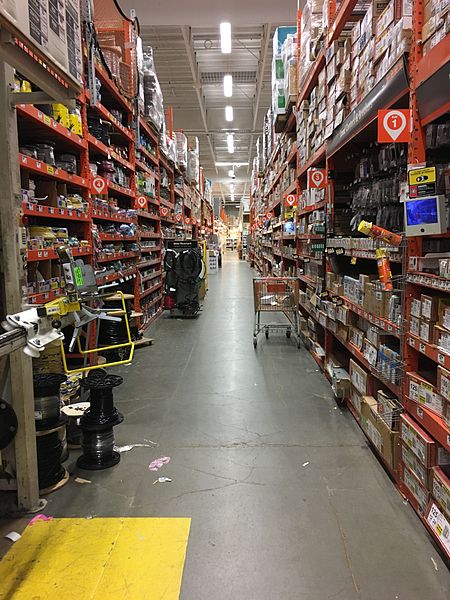MyCHIPs Digital Money

Adding Another Employer
To start to understand how things work in a more complex economy, let’s take a very small step by adding just one more employer. After all, Wal-Mart really doesn’t sell everything we need. So we will add Home Depot to the mix because they really have a lot more power tools and other cool things we can use around the house. In fact, we could probably build a house just from the stuff we can get at Home Depot.
So you still work at Wal-Mart, but your neighbor, Bob works at Home Depot. Just as you accumulate credits in your Wal-Mart account, Bob accumulates credits in his Home Depot account. He can go into Home Depot any time and buy some of those great tools. How can you get stuff from Home Depot too?
All it takes is some trust between your two employers. Sure, Wal-Mart and Home Depot may compete in certain areas. But they have some mutual respect for each other too. And they would both like to sell more things–even if it is to employees of another company.
So they come up with a mutual agreement whereby they will vouch for the credit of their own employees. In other words, Wal-Mart will stand behind your purchases at Home Depot. They become a guarantor of your credit, or a credit certifier. And Home Depot can do the same service for Bob. This way, both of you can shop at both stores, as long as you don’t exceed some agreed-upon credit limit.
But how do the two stores settle accounts between them? Won’t they have to get some “real bank money” and send it over to the other guy at some point? That depends only on the level of their trust.
If Wal-Mart can trust that Home Depot will stay in business, and honor its debts, there is no reason to ever have any other money than a promise from Home Depot. In other words, Wal-Mart can just debit its balance sheet for any amounts owed from Home Depot. And Home Depot can credit its balance sheet for the same amount.
In this case, Home Depot is the borrower and Wal-Mart is the lender. As long as a Home Depot note is trust-worthy, and in demand, there is no reason to have to convert it to a central bank note.
And as you can imagine, the balances are likely to fluctuate in both directions. In one month, Home Depot might owe some amount to Wal-Mart. But the next month, the obligation might go in the opposite direction.
And these balances are not just affected by the purchases of you and Bob. Wal-Mart might want to buy a hammer and some nails from Home Depot to repair a damaged checkout counter. And Home Depot might need some office supplies from Wal-Mart to use in their accounting department.
Each of these purchases can be tabulated in the same computer accounts. And they will either result in the creation of new credit or the redemption, or elimination of existing credit.
